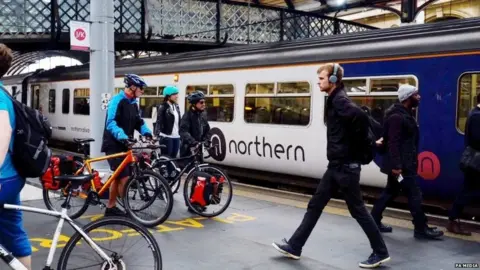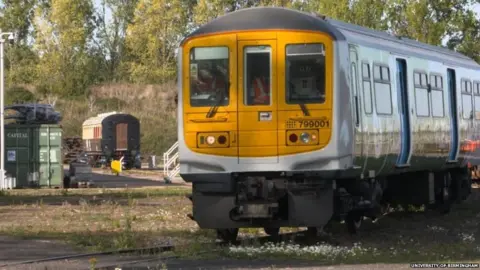Can Boris Johnson's levelling-up mission survive Covid?
 PA Media
PA MediaThe UK can and will "build back better".
The Conservatives' theme at their virtual party conference this week is a message that Boris Johnson has sought to impart continuously since the country emerged from lockdown in early July.
But as the prime minister prepares to deliver his leader's speech on Tuesday, his party is facing up to the impact that the worst public health crisis for a century is likely to have on its ability to deliver on its promises to voters.
The PM has insisted his mission of national renewal, the "levelling-up" agenda which was a key backdrop to the Tories' thumping victory in December's election, has not been put to one side in the national struggle against Covid.
He says the programme, which the party describes on its conference website as "driving lasting change in parts of the country forgotten by successive governments", is being accelerated, rather than slowed, by the pandemic.
'Blue wall'
And the rush of announcements made during the four-day event and beforehand suggest the government knows it cannot afford to lose sight of its over-riding objective, that is to give those living outside London and the south of England a better chance in life and bigger slice of the economic cake.
In his own speech, the PM will earmark £160m to upgrade ports and infrastructure in Teesside, the Humber and other areas as part of a drive to make the UK a world-leader in low-cost green energy.
Elsewhere, the lion's share of a £80m fund for local regeneration projects is going to towns in the North East, North West and Yorkshire, a review of transport links will look at upgrading the A1 in Northumberland, while a shake-up of vocational education will pay for all 18-year-olds without an A-level to take a college course.
These are all consistent with the Tories' promises in their election manifesto to share prosperity and opportunities more equally across the UK and to boost economic performance beyond the capital.
The party is also seeking to leave a more permanent imprint of its own by opening a second HQ in Leeds while creating a fighting fund to help its MPs defend the dozens of "Red Wall" seats snatched from Labour in December, some of which turned blue for the first time in electoral history.
But as Conservative activists grapple with the role that transport, green and digital technologies will play in the UK's post-Covid recovery, the legacy of what is the UK's deepest post-war recession cannot be ignored.
'Daunting task'
The Institute for Fiscal Studies says the government faces a "daunting task" if it is to reverse deep-seated regional inequalities, among the most pronounced in Europe, in the current climate.
In a recent analysis, the respected think tank warned that inequalities within regions are often more acute, with towns in post-industrial regions, coastal resorts and isolated rural areas among those which have fallen furthest behind, a situation which could be exacerbated by Covid and any disruption to post-Brexit trade with Europe.
 PA Media
PA MediaEven "well-designed policies could take years or even decades to have a meaningful effect", it says.
While the government is right to focus on addressing decades of under-investment in transport and R&D outside London and the South East, it says the cost of closing the gap cannot be underestimated, with £22bn alone being needed to bring per person spending on transport across England in line with that in the capital.
The government, it adds, "cannot be all things to all places".
Whatever improvements can be made in infrastructure, housing and skills, the IFS says the success of the levelling-up agenda will inevitably be judged on how far employment and pay disparities can be closed.
'By a thread'
Middlesbrough, identified by the think tank as one of the five most "left-behind" towns in terms of working-age employment rates, has had some recent success stories to celebrate.
Start-up bank GBB announced recently it would set up its headquarters in the town, creating more than 120 jobs, while the National Hydrogen Transport Centre is also basing itself there - consolidating the Teesside's market-leading position in the emerging clean technology.
But, at the same time, Covid is casting a long shadow over the North East, with the Mayor of Middlesbrough warning that thousands of jobs in hospitality and retail are "hanging by a thread" due to local restrictions.
 University of Birmingham
University of BirminghamSpeaking to the BBC's Newscast podcast last week, Andy Preston - who despite being an independent is admired by local Tories - said the implications of the virtual lockdown for the local economy were "monstrous".
He said he had been left "fuming" at what he said was the lack of consultation and dialogue with ministers over restrictions, which have prompted claims of a growing North-South divide in the second wave of the disease.
Local relations
The fraying in relations between local leaders and ministers does not augur well at a time when the government's blueprint for further devolution in England has reportedly been shelved until next year.
Far-reaching plans to create more combined authorities and directly elected mayors, while at the same time abolishing a raft of district councils, have caused unease in some Tory heartlands.
Former deputy prime minister Lord Heseltine, who championed English devolution while advising David Cameron, has urged the government to get on with it, saying a lack of local delivery mechanisms is hampering progress.
"There should be no presumption that civil servants in London devising schemes which seem sensible to ministers should be imposed on local economies," he told a recent meeting of the Lords Economic Affairs Committee.
But the former Tory, who lost the party whip after rebelling against the government over Brexit, has urged ministers to get the capital on board and not give the impression that London is being penalised for its success.
"It is very difficult to see how you level up without levelling down somebody," he said. "You are never going to make a success of an economy by holding back the most successful core part."
